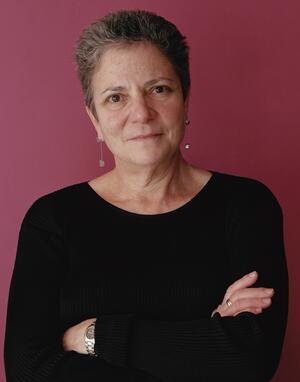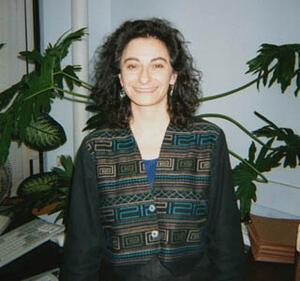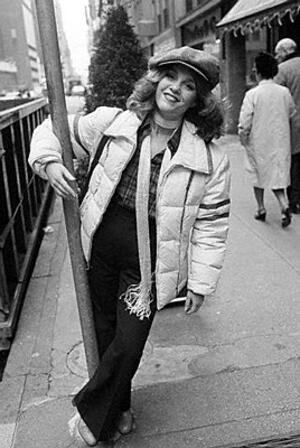Happy Mother's Day from JWA
Introduction
In the late 19th Century, Anna Reese Jarvis attempted to create a holiday to honor mothers, hoping this would help heal the emotional scars left in families due to the Civil War. Though Anna died in Philadelphia in 1905, never seeing the dream realized of a day to honor mothers, it would eventually come true: On May 9, 1914 President Woodrow Wilson declared "Mother's Day" an official American holiday. He encouraged the public to express their reverence for mothers on this day, and we've been purchasing carnations, chocolates, and Hallmark cards filled with kind sentiments on the second Sunday of May ever since. JWA marks the occasion by sharing how three remarkable Jewish women featured in our archives were influenced in distinct ways by their own mothers.
To further represent the diversity of "Jewish Mothers," JWA has set up a special collection on Flickr, a photo-sharing service, called "Jewish Mothers: The way we were, the way we are". Photos can show a Jewish mother, now or in the past, in any context—mothers at home or at work; mothers in the family and in the community; mothers of different generations and family constellations; formal portraits or candid snapshots.
How would you like to represent Jewish mothers? Visit our photo pool on Flickr, upload your own photos, add comments or tags to others.
Gay Block, Portrait Photographer
As a portrait photographer, Gay Block began in 1973, with portraits of her own affluent Jewish community in Houston. Later work includes girls at summer camp, retired Jews of Miami's South Beach, and grocery employees in Texas. Her landmark work with writer Malka Drucker, RESCUERS: Portraits of Moral Courage in the Holocaust (both a book and traveling exhibit), has been seen in over 50 venues in the U.S. and abroad, including the Museum of Modern Art (MoMA), NY, in 1992. Each of her projects has included a film or video component in addition to the photographs. Block's photographs are in many museums and private collections including MoMA, San Francisco MoMA, and The Museum of Fine Arts, Houston. Block's most recent completed work, a visual autobiography of her mother, can be seen in three distinctly different formats: a book from the University of New Mexico Press, Bertha Alyce: Mother exposed; an award-winning 24-minute video, included with every book and already seen in over 25 film festivals; and a traveling exhibition.
On her mother's influence: Through the years when I showed Mother the pictures I made of her, we talked and laughed about them, but I didn't exhibit them because they all looked angry to me, not like successful art pieces. But about a year after her death these same photographs no longer looked angry to me. I had begun to miss her. I had begun to understand that her anger had its origins in all she had not been able to do because she was a woman.
Rebecca Young, Prisoner's Rights Lawyer
Born in 1964, Rebecca Young was raised in New York City, the only child of two artists. Her parents divorced when she was seven, and Rebecca and her mother struggled with poverty – an experience which Rebecca says made her sensitive to the challenges faced by poor people. At age 13, Rebecca's mother died, and Rebecca was sent to Virginia to live with a cousin. Soon after, she recalls watching a made-for-TV movie about death row inmate Caryl Chessman, which piqued her interest in prisoners' rights. Rebecca remained fascinated by the topic, and went on to volunteer in Massachusetts prisons during her undergraduate study at Harvard. In 2000, Rebecca designed and helped implement the Rapid Response to Brutality Project, which sought to deter the frequent victimization of prisoners by correctional staff through vigilant monitoring of prison brutality. This speeds up the process whereby assaults are reported, and calls for swift follow-up after assaults to ensure that prisoners get needed medical treatment.
On her mother's influence: I think I always saw my mother as a role model. Despite our financial situation and all kinds of other things, I really saw her as someone who was very strong and who spoke her mind. She stood up for what she believed in and managed to maintain her dignity with those welfare workers who wanted to treat her like sh-t.."
Madeline Kahn, Actress and Comedian
A perennial scene-stealer, Madeline Kahn appeared in some of the funniest movies in Hollywood history, leaving a legacy as one of the all-time hilarious ladies in show business. While primarily achieving fame through her comedic work, Madeline was also an accomplished stage and television actress. After graduation, she began to audition for acting parts in New York. Within a year, Madeline had landed a chorus role in the revival of Kiss Me Kate and made her Broadway debut in Leonard Stillman's New Faces of 1968. By 1973, she received her first of four Tony Awards nominations for In the Boom Boom Room. Although Madeline would have over 40 films to her credit, she often returned to the stage in New York, which she continually called home. Madeline won a Tony Award in 1993 for best actress for her role as "Gorgeous Rosensweig" in Wendy Wasserstein's The Sisters Rosensweig.
On her mother's influence: Although her mother was Jewish, Madeline was not raised in an observant household; she once said in an interview that her mother "investigated various religions." When Madeline took on the role of "Gorgeous" in The Sisters Rosensweig, however, she says her mother went out of her way to find women in her community who allowed her to videotape their rituals. With wonder, Madeline reflected that, "These people observe the Sabbath and enjoy it, and were sweet enough to send me the tapes so I could study them. So that is how the Jewish tradition was passed along in our family."





